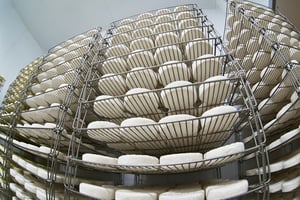 In the food manufacturing industry, there’s constant scrutiny from both regulators and the general public when it comes to the safety of your food products. Any mistakes that let an unsafe product through the door can result in food safety investigations as well as an enormous amount of negative press.
In the food manufacturing industry, there’s constant scrutiny from both regulators and the general public when it comes to the safety of your food products. Any mistakes that let an unsafe product through the door can result in food safety investigations as well as an enormous amount of negative press.
To minimize risks, every aspect of your production line needs to be as close to perfect as you can get. This includes running comprehensive Hazard Analysis and Critical Control Point (HACCP) checks, using top-grade product inspection equipment, and having top-quality food-safe metal forms for your production process that are compatible with your existing equipment, manufacturing processes, and sanitation procedures.
When you’re looking for a potential food grade sheet metal forming vendor to supply those process and equipment-compatible trays and containers, it’s important that you make sure the vendor can actually supply what you need. A huge part of vetting a vendor is knowing what questions you should ask.
To help you vet a potential food grad sheet metal forming vendor, here are a few questions that you should ask:
1: What Tolerances Can You Meet and How Do You Ensure Consistency in Meeting Them?
Some of your more specialized equipment might require that any metal trays or baskets you use are a very precise size to ensure a consistent fit. Or, you may want a custom food-grade metal form that stacks to save storage space.
Either way, you’ll need a metal form that can consistently meet a tight part tolerance. Knowing what part tolerances the vendor can meet and how they achieve them can tell you a lot about the quality of the metal forms you’ll be getting.
2: What’s Your Average Time-to-Delivery?
You should be able to know just how long you can expect to wait to get a shipment from your custom metal forming vendor after you place your order. With this information, you can better create realistic timetables for your own production.
3: Which Food-Safe Metals Do You Work with?
Just because a metal is listed as “food-safe,” that doesn’t mean that it’s ideal for your particular food production application. For example, some grades of stainless steel, such as 430, have decent resistance to mild acids and alkalis but are easily corroded by salt. If your food manufacturing process involves large amounts of salt, then grade 316 stainless would be a much better choice.
A vendor that has experience working with a wide variety of food-safe metal alloys is often better-equipped to handle your food production needs.
4: What Coatings Would You Recommend for My Process, if Any?
An experienced custom metal form vendor can often recommend a good coating for your metal trays or baskets that can enhance the performance of your custom metal trays or significantly prolong their useful life.
Of course, to answer this question, the vendor is going to need to ask a few questions of their own about your process. This is a good way to sort out the true experts and partners from the low-quality vendors that won’t take your actual needs into account when designing a custom tray or basket for you.
Basically, if the vendor doesn’t ask you for specifics about your production process before recommending a coating, they probably aren’t going to provide an optimal food-safe metal form.
5: How Do You Make Sure That Your Custom Metal Forms Will Work with My Process?
Any vendor that you go to should have a set process for ensuring that their metal forms will satisfy your custom forming needs. This quality assurance process is critical because it can mean the difference between quickly getting a large number of metal forms that will work for your needs, and weeks of delay (or worse, getting metal forms that don’t work for your needs).
A physical prototyping process is okay but slow. It can take weeks for a major flaw to become evident, in which time your own production timetable will suffer.
This is why Marlin Steel uses Autodesk physics simulation software to test custom metal form designs against the use conditions they’ll be exposed to. With a virtual test, years of exposure to your production process can be simulated in minutes, and a specific failure report can be generated detailing the cause of the failure. Any flaws in the design noted during these tests are corrected before Marlin’s degreed engineers commit a single square inch of metal to the production process.
Using a virtual testing process helps to save significant time and resources over traditional prototyping—largely because there’s no need to repeatedly retool the production line for each new design iteration.
These are just a few of the questions you should ask a food-grade sheet metal forming vendor before you make an order. Need help getting a custom metal form for your food production process? Contact Marlin Steel today!



.gif)


